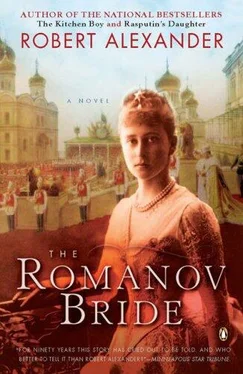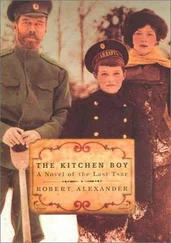Surprised-no, shocked-I hesitated.
I should have dropped the black rag right then and there. Had I done so, Kalyayev would already have been darting from the shadows of the Aleksandrovski Gardens. Instead, I waited a moment too long, and in that moment I saw not just the Grand Duke and Grand Duchess Sergei but two others sitting right opposite them. And not two other adults… but children! Bozhe moi, my God, it was their young charges, the girl and the boy! Nothing could have stunned me more. We had rejoiced at the idea of blowing up the Grand Duke Sergei. We had all agreed, if need be, to kill his wife, the Madonna of Romanov princesses, as well. But young ones? Could I throw the black rag to the cobbles and thereby condemn these children to a bloody and violent death?
Without even thinking, I turned away, my body shivering madly. Killing a man known and hated for his iron rule was one thing. Even murdering his wife as well was somehow acceptable. But blowing to pieces these young ones, royal or not, was not right. I couldn’t do it! We hadn’t talked of this possibility, that the young Grand Duchess Maria and Grand Duke Dmitri might be accompanying their foster parents to the opera, but there they were, sitting opposite their guardians!
I turned and hurried off without dropping the black rag, proving beyond a doubt that despite the murder of my own wife and unborn child there was still something human left alive in my dark heart.
“Why do you always do that?” asked my husband.
“Do what?” I replied as we drove toward the Bolshoi.
“Greet people like you just did with that man back there. He charged up to our carriage and you met his curiosity with a pleasant nod of your head.”
“Well… well…” I said, rather flustered. “I suppose I was simply trying to do my duty.”
“In the future you shouldn’t be so open. People are always staring upon us, and if you acknowledge them in any way it only encourages them. Is that what you want, people looking upon us as if we were monkeys?”
My face burning, I muttered, “Of course not.”
I folded my hands in my lap and glanced out the window, not venturing another word and not daring to gaze upon the children, either, for I knew they were studying me, perhaps taking delight in my humiliation. But… but wasn’t that my duty, to reach out to our people, to inspire the best in them? Of course it was. And yet I couldn’t counter my husband, not in front of the young ones.
I wanted to cry. I wanted to lash out. Instead I reached out and rested my trembling hand upon my husband’s arm. Sergei ’s inner soul, I knew, was so conflicted, so tortured, and I had to remind myself that my greatest duty was to him, and my greatest task then was to soothe the poor man, who, it was true, had become embittered not just by his own appetites but by the murder of his father as well. Yes, it was Sergei’s own father, Aleksander II, who had freed the serfs in 1861, saying “Let us liberate the serfs from above or they will liberate themselves from below.” It was Aleksander II, as well, who had planned to end autocratic rule in Russia by introducing a European-style constitution. This would have long come to pass were it not for the revolutionaries, for just days before the constitution was to be released they had blown the Tsar apart.
And with what result?
The revolutionaries had believed this death would spark a great revolution, but in fact it created not a single demonstration, only widespread mourning. And the new Tsar, Aleksander III, what did he and the Grand Dukes think, including my dear Sergei? Well, they came to hate any kind of revolutionary or progressive thought, for it was the revolutionaries who had killed their father. Worse, they fully believed the murder of Aleksander II was God’s punishment for the Tsar’s folly with liberalism. My husband, shocked by the savage murder of his father, especially felt this, just as he believed that the only way to deal with unrest was by force. And so the great constitution, Russia ’s first, was promptly withdrawn.
Oh, I knew revolutionaries wanted to go from Tuesday to Friday in one giant leap, but were it not for them Russia would long ago have had a constitution. One had only to look upon the murder of Aleksander II to realize that that horrific act took our dear land not forward but back to Sunday, if not further.
And just look at what was now happening, I thought, peering out at a broken street lamp and windows that had been smashed during the recent riots. Just how far were we retreating into chaos? Oh, the simple people of our Russia didn’t know what they were doing in these dark days. They were like sick children whom one loved a hundred times more in their illness than when they were well and happy. One longed to ease their sufferings, to teach them patience. This, I knew, was what I felt more every day.
And then the opera…
Suddenly the grand building with its great columns and electric illumination came into view. Suffice to say that it was a command performance, that our beloved talent, Boris Shalyapin, sang his most famous role, Boris Godunov, which, Sergei remarked, the poor man probably had to sing as often as a tea-kettle whistles. And all society, dressed in their finest uniforms and gowns, were greatly pleased to see Sergei and me in attendance, so I did collect much money for my Charity Fund, and the evening was a grand success.
Having failed in my task, I retreated into the night shadows of the Aleksandrovski Gardens, shaking and sweating despite the frost. What had I done? Had I ruined the plan altogether? But how else could I have acted, what choice was there?
Little Kalyayev, his sweet face tense with anxiety and cradling the bomb, came dashing toward me, and demanded, “What is it? What happened? Was the Grand Duke not in the carriage?”
“He was there-I saw him!”
“Then what-?”
Shaking and nearly in tears, I pleaded, “I couldn’t kill children!”
“What do you mean, what children?”
“Tell me I did the right thing!”
“You fool, what are you talking about?”
Savinkov, the Polish fellow on the sleigh, the one from whom I had got the bomb, suddenly appeared out of nowhere. Together the two of them pulled and pushed me into a hidden area, where they pinned me against a tree.
Pressing a knife against my throat, Savinkov hissed, “The Grand Duke’s carriage passed right by me as it drove around the corner-he was in there! I saw him with my own eyes! And he’d already be dead if it weren’t for you! You failed and now you’ve put the entire operation in danger!”
“But children… I saw them in there, that young Grand Duchess and Duke, and… and…!”
“What children? I saw none!”
“They were in there, the young ones, sitting just opposite the Grand Duke Sergei!”
All but screaming in my ear, Kalyayev demanded, “Are you a traitor to our cause? Have you betrayed us to the police?”
“No, I swear!” I pleaded. “The Grand Duchess Elisavyeta was in there, too, and I would have given the signal… but the children, the two little ones! I saw the Grand Duke and Grand Duchess and the two children-I saw them all! But… but we never talked about this, what we should do if there were children present! Forgive me, I just couldn’t do it!”
Kalyayev turned away, slammed his fist against his own forehead, and said, “If all four of them were really in the carriage, then our friend here is correct, we couldn’t kill them, not the little ones.”
“What the devil are you talking about?” demanded Savinkov.
“We want the Grand Duke’s death to unleash revolution and… and…” Kalyayev fell into desperate thought. “And that wouldn’t happen if we started killing children. That would turn the workers and mothers against us, not for us.”
Читать дальше












